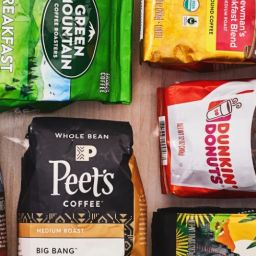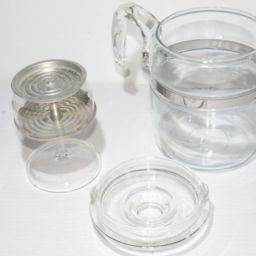
Understanding the Basics of Sore Throat
A sore throat is an uncomfortable condition characterized by pain, scratchiness, or irritation in the area. It is often the primary symptom of a variety of health issues, such as viral infections like cold or flu, bacterial infections like streptococcus, or environmental factors like allergies.
One’s vulnerability to a sore throat can also increase due to factors such as smoking, dry air, shouting, or even certain medical treatments.
Bearing in mind the connection between what we consume and our throat health is crucial. Consuming harsh or irritating substances can exacerbate the condition, while soothing ones can offer much-needed relief.
Notably, beverages play an important role here; acting as double-edged swords, they can either relieve or aggravate the symptoms associated with a sore throat. The type and temperature of the beverage, in conjunction with these factors, can significantly impact throat health.
Buy your new Coffee Maker on Amazon now!
The Role of Beverages in Throat Health
Maintaining throat health involves a careful balance of hydration and nourishment. Beverages play a crucial role in this equation.
Consuming the right kind of drinks can help relieve irritation, nourish throat tissues, and prevent conditions such as a sore throat or voice loss. Liquids also lubricate the vocal cords and throat tissues, which can reduce discomfort and help maintain throat health.
Various beverages, from water, herbal teas, juices, to coffee, have different impacts on your throat. While water remains the universal hydrator, other drinks like herbal teas or warm honey lemon water can offer relief from a sore throat.
On the other hand, drinks like coffee, have more complex impacts this is due to the presence of caffeine and other compounds that may affect throat health. They can both alleviate and exacerbate throat discomfort, depending on various factors such as the frequency of consumption and individual body reactions.
Buy your new Coffee Maker on Amazon now!
Exploring Coffee and its Properties
Coffee is a widely-consumed beverage around the world, best known for its robust flavor and stimulating properties. At the heart of its chemical makeup is caffeine, a natural stimulant that interacts directly with the central nervous system.
This bitter white crystalline substance is actually inherently tasteless and odorless, but plays an important role in the general appeal of coffee. It’s the jolt that coffee drinkers seek to kick-start their day, relieve the mid-afternoon slump, or burn the midnight oil.
On the other hand, coffee is imbued with an array of other compounds that contribute to its rich palette of flavours and aromas.
Key among these are antioxidants, molecules that safeguard the body’s cells against damage from free radicals. These potent antioxidants often include chlorogenic acids, melanoidins, and furans, which not only offer potential health benefits, but also play a critical role in establishing the unique sensory profile of coffee.
Furthermore, coffee contains essential nutrients like riboflavin, pantothenic acid, and niacin that are vital to human health. It’s quite a powerful mix that goes beyond just a quick energy boost.
How Coffee Affects the Body
From stimulating the nervous system to impacting digestion, the effects of coffee on the human body are multifaceted. Acting as a central nervous system stimulant, coffee can aid in enhancing alertness, attention, and cognitive function.
In addition, the dark beverage plays a significant role in boosting metabolic function and energy levels. By promoting the release of neurotransmitters like dopamine, it can elevate mood and overall sense of well-being.
However, consumption of coffee also engages pathways that can lead to acidity and heartburn. Several other compounds found in coffee can influence stomach acid production, often leading to gastrointestinal upset.
Moreover, caffeine, the active component in coffee, causes a diuretic effect, stimulating the kidneys to excrete more water. This diuresis can result in dehydration if fluid intake isn’t sufficiently maintained. Regular consumption of coffee thus has noticeable, and sometimes conflicting, impacts on physiological processes within the body.
Buy your new Coffee Maker on Amazon now!
Coffee’s Impact on Throat Health
In assessing the effects that coffee has on the throat, the beverage’s acidic nature surfaces as a key contributor. Coffee contains chlorogenic acid – this factor is often overlooked when analysing the drink’s properties.
Chlorogenic acid in coffee can stimulate the production of stomach acid, which might aggravate existing throat conditions such as acid reflux or laryngopharyngeal reflux.
Simultaneously, caffeine, a well-known stimulant present in coffee, poses potential implications for throat health. Intake of caffeine can lead to dehydration, resulting in a dry throat and intensifying discomfort.
The impact is particularly noticeable in individuals who frequently consume coffee. Therefore, understanding these properties is critical in determining the beverage’s effect on the throat.
Potential Benefits of Coffee for Throat Discomfort
Though the relationship between coffee and throat health might not be immediately evident, there are indeed potential advantages linked to moderate coffee consumption.
One of the main benefits lies in its warm and soothing effects on the throat. The heat can alleviate discomfort, serving as a temporary reliever of throat soreness. Moreover, the act of sipping a warm beverage like coffee can be comforting and therapeutic in itself.
Moreover, coffee contains caffeine, which is known to have a natural analgesic, or pain-relieving, impacts. Those struggling with a sore throat might find some relief in this.
Coffee is loaded with antioxidants which may potentially contribute to overall healing. Notably, the benefits can commonly be reaped at moderate levels of intake.
Overconsumption could potentially lead to negative effects, which will be discussed later. In sum, moderate coffee consumption can potentially have a soothing effect on the throat due to its heat and caffeine content. However,
it’s important to remember that these benefits are generally temporary and should not replace medical advice or treatment.
Buy your new Coffee Maker on Amazon now!
Potential Drawbacks of Coffee for Throat Discomfort
Despite its potential benefits, consuming coffee may not always be advantageous for those experiencing throat discomfort. One of the primary reasons for this is that coffee is naturally acidic, which can cause irritation or harm to an already inflamed or sensitive throat.
Over time, this acidity could exacerbate throat discomfort and potentially contribute to more serious conditions, such as gastroesophageal reflux disease (GERD).
Moreover, coffee, especially if served hot, could lead to thermal burns in the throat, causing discomfort and prolonging the healing process of a sore throat.
Additionally, as a mild diuretic, coffee can lead to dehydration if consumed in large quantities, a situation that often exacerbates throat pain. It’s important, therefore, to consume coffee in moderation and to ensure optimal hydration when dealing with throat discomfort.
Buy your new Coffee Maker on Amazon now!
Alternatives to Coffee for Sore Throat Relief
If coffee doesn’t best suit your throat health needs, consider swapping your cup of joe for more throat-soothing alternatives. Some more gentle options include herbal tea, warm water with honey, and broth-based soups.
Herbal teas, often caffeine-free, deliver warm and hydrating relief, particularly when complemented with a spoonful of anti-inflammatory honey or lemon. Peppermint, chamomile, and licorice root teas are top picks for their natural soothing properties.
For those not fond of tea, a simple concoction of warm water with honey can work wonders. Honey, renowned for its natural healing properties, can coat an irritated throat and alleviate discomfort.
Furthermore, broth or stock-based soups provide nourishment and hydration, crucial for a speedy recovery. Warm liquids can help soothe the throat and alleviate pain and swelling, making them an ideal alternative for those sensitive to coffee.
Expert Opinions on Coffee and Sore Throats
Health professionals emphasize that the consumption of coffee, especially when hot, may soothe or intensify an aching throat depending on individual reactions to caffeine and acidity.
Notable dietitian Jane Roberts mentions that hot coffee can actually provide temporary relief for a sore throat, much like warm soup or tea, which soothes and moistens the throat.
On the other hand, Dr. Paul Morgan, a renowned ENT specialist, suggests that coffee’s high acidity can further irritate the throat, particularly if inflammation is present.
He suggests drinking coffee moderately or switching to decaf to alleviate any potential discomfort. Therefore, individuals experiencing a sore throat should consider their own tolerance and reactions to coffee.
Buy your new Coffee Maker on Amazon now!
Practical Tips for Managing a Sore Throat
Staying hydrated is crucial when it comes to managing a sore throat. Drinking fluids not only prevents throat dryness but helps the body fight off infections.
It’s recommended to consume clear broths or warm water, herbal teas, and non-caffeinated beverages. Similarly, certain foods such as honey or ginger can be helpful due to their anti-inflammatory properties.
However, their effectiveness can be compromised by things like smoking or excessive talking. Avoiding irritants, such as these, is key for faster recovery.
It’s also important to rest your voice when your throat is sore, trying to avoid strain as much as possible. Keeping a humidifier in your space can also help as dry air can aggravate a sore throat.
Continuing to eat healthy is also essential in managing a sore throat. Consuming nutritious foods can boost your immune system and help your body fight off the infection faster. Incorporate fruits, vegetables, lean proteins, and whole grains into your meals.
• Fruits like oranges or strawberries are high in vitamin C which boosts immunity.
• Green leafy vegetables such as spinach or kale provide essential nutrients for overall health.
• Lean proteins like chicken or turkey can aid in repairing body tissues.
• Whole grains offer fiber that aids digestion and keeps you feeling full.
Over-the-counter medications can be beneficial as well. Using OTC drugs, such as lozenges or numbing sprays, may provide temporary relief from the pain of a sore throat.
• Lozenges often contain ingredients like menthol which numb the throat.
• Sprays typically include a local anesthetic that temporarily relieves pain.
Remember to always follow package directions when using these products and consult with a healthcare provider if symptoms persist beyond a few days.
Lastly, practicing good hygiene habits is crucial to prevent spreading germs and worsening your condition. Maintaining proper hygiene includes:
• Regular hand washing especially before meals
• Avoid sharing utensils or drinks
• Covering mouth while coughing or sneezing
By following these practical tips, one can manage their sore throat effectively while promoting faster recovery.
Read more about What Is A Milk Derivative In Coffee Creamer.
FAQS
What are the basics of managing a sore throat?
Understanding the cause of the sore throat and addressing it appropriately through rest, hydration, over-the-counter remedies, and sometimes, medical intervention, is the basic approach to managing a sore throat.
How do beverages impact throat health?
Beverages can either help soothe a sore throat or exacerbate the discomfort. Hydrating drinks like water, warm tea, or soup can ease the pain, while overly acidic, alcoholic, or caffeinated drinks might cause further irritation.
Does coffee have properties that affect throat health?
Yes, coffee contains caffeine and acidity that can affect throat health, potentially leading to irritation and dryness, especially in individuals with a sensitive throat.
How does coffee affect the body?
Coffee can stimulate the central nervous system, increase metabolism, and offer antioxidant benefits. However, it can also lead to dehydration and acid reflux if consumed excessively.
Can coffee potentially relieve throat discomfort?
In some cases, warm coffee may soothe a sore throat mildly. However, it’s important to remember that coffee’s caffeine content can cause dehydration, which in turn, can worsen the sore throat.
What are the potential drawbacks of using coffee for sore throat relief?
The high acidity of coffee can exacerbate the discomfort of a sore throat. Also, caffeine in coffee can lead to dehydration, which may worsen the condition.
Also take a look at Which Coffee Has The Most Milk.
What are some alternatives to coffee for sore throat relief?
Warm water, herbal teas, hot soup, and warm lemon water with honey are great alternatives to coffee for sore throat relief. They are hydrating and have soothing effects on the throat.
What do experts say about coffee and sore throats?
Most health experts advise against consuming coffee when dealing with a sore throat due to its potential to cause dehydration and irritation.
Do you have any practical tips for managing a sore throat?
Yes, managing a sore throat effectively involves resting your voice, staying hydrated, avoiding irritants like smoke and dust, consuming soothing foods and beverages, and seeking medical advice if the symptoms persist.
Check out this post and learn How to Make Good Coffee.









